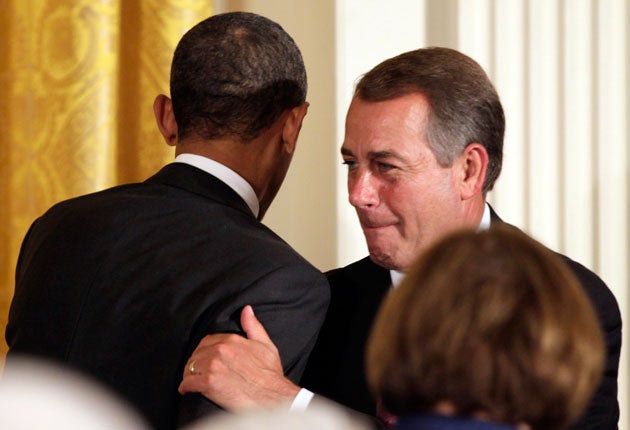$14.294 trillion in the red, so US Treasury must stop borrowing

After months of hand-wringing, the US Government has reached its debt limit, forcing lawmakers to embark on a series of emergency measures to prevent public finances from going into immediate default.
A tranche of roughly $72bn in bonds and notes issued by the US Treasury yesterday left the national coffers exactly $14.294tr in the red, meaning that there is for the time being no capacity for additional public borrowing. The Treasury Secretary, Timothy Geithner, said he would pull an accounting trick, suspending investment in two large federal retirement funds and allowing the Government to meet its financial obligations until 2 August.
In the meantime, lawmakers must negotiate a deal that will see the debt ceiling raised. If they fail, the US will default on trillions of dollars of bonds, potentially plunging the world economy into meltdown.
Part of any agreement will be efforts to balance a budget that has been in the red since shortly after Bill Clinton left office.
Vice-President Joe Biden has been holding negotiations with lawmakers from both parties over the types of deficit-cutting measures that need to be approved to win congressional approval of a higher debt limit. However, a solution still appears elusive, with politicians divided along party lines.
Republicans say they will only countenance deep spending cuts as a way to achieve a balanced budget. "Everything should be on the table except raising taxes," the House Speaker, John Boehner, said at the weekend.
Democrats, on the other hand, would prefer to let Bush-era tax cuts for the super-wealthy expire, and to end tax breaks for the largest oil companies. They believe that would save the Treasury about $4tr.
President Barack Obama warned last week: "If investors around the world thought that the full faith and credit of the United States was not being backed up – if they thought that we might renege on our IOUs – it could unravel the entire financial system."
The US Congress has set the country's debt limit since 1917. Although it has from time to time seen difficult negotiations, the issue has rarely been used as a political football.
Unlike governments in many developed economies, the Obama administration has chosen not to slash public spending following the credit crisis, in the hope that the extra economic activity would create jobs and increase tax revenues.
Join our commenting forum
Join thought-provoking conversations, follow other Independent readers and see their replies
Comments
Bookmark popover
Removed from bookmarks